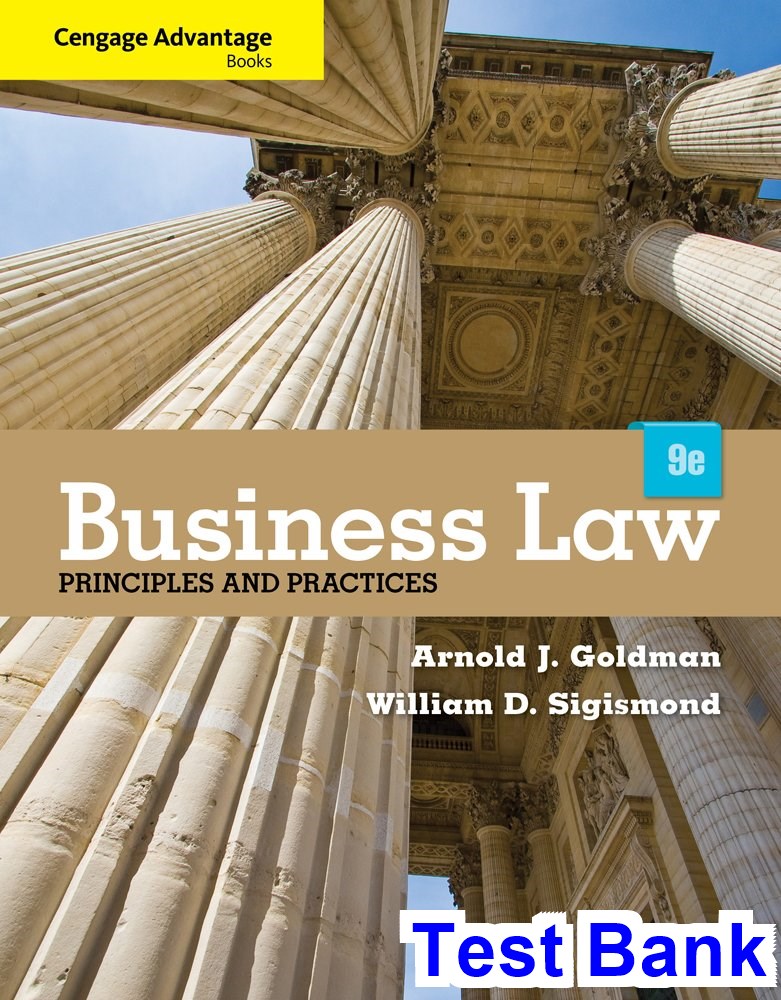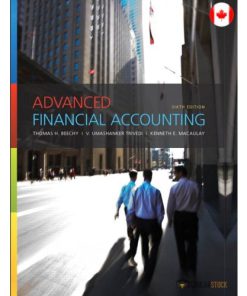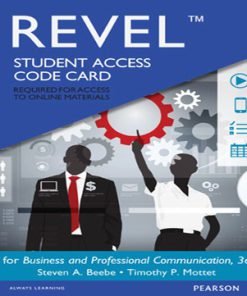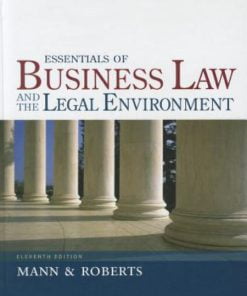Cengage Advantage Books Business Law Principles and Practices 9th Edition Goldman Test Bank
$35.00 Original price was: $35.00.$26.50Current price is: $26.50.
Cengage Advantage Books Business Law Principles and Practices 9th Edition Goldman Test Bank
Sell by: Jacob Miller
SKU: zbeci718492
Category: Test Bank
This is completed downloadable of Cengage Advantage Books Business Law Principles and Practices 9th Edition Goldman Test Bank

Product Details:
- ISBN-10 : 1133586562
- ISBN-13 : 978-1133586562
- Author: Arnold J. Goldman, William D. Sigismond
Prices for items sold by Amazon AU and third party sellers include NZ GST (if applicable). For items sold by Amazon Global Store, NZ GST will be calculated at checkout. For further information please see
BUSINESS LAW: PRINCIPLES AND PRACTICES, 9E has been revised dramatically to enhance learning! The 9th edition offers a new learning system with clear learning objectives to guide students. The fresh two-color design engages students with its contemporary features: Ethics in a Business Setting, You React, and the Self-Check Quizzes. The case examples are presented in readable segments to be clear, current, and jargon-free. Co-authored by Arnold J. Goldman, a practicing attorney and William D. Sigismond, a veteran business law educator, this straightforward text shows students about the law using fascinating cases and ethical dilemmas. Hypothetical examples immediately follow discussion of concepts to further reinforce understanding. The new edition is updated throughout to reflect recent changes in the law, covering legal rights and responsibilities in both the public and private sectors.
Table of Content:
- Brief Contents
- Contents
- Preface
- Acknowledgments
- Part 1: Understanding Your Legal Environment
- Ch 1: Foundations of Law and the Role of Ethics in Business
- Learning Objectives
- Why Laws are Important
- The Nature of Law
- The Legitimate Functions of Law
- Development of Law
- Sources of Law in the United States
- Civil Law versus Criminal Law
- Uniform Laws
- The Impact of Unethical Behavior in the Workplace
- Ethical Challenges in the Workplace
- Key Points in Chapter
- Important Legal Terms
- Questions and Problems for Discussion
- Ch 2: The Legal System in the United States and Its Constitutional Foundation
- Learning Objectives
- The Role of the Judiciary in the United States
- The State Court System
- The Federal Court System
- Participants in the Legal System
- The Constitutional Framework of the U.S. Legal System
- Key Points in Chapter
- Important Legal Terms
- Questions and Problems for Discussion
- Ch 3: Personal, Business, Cyber Crimes and the American Criminal Justice System
- Learning Objectives
- Prologue
- Nature of Criminal Law
- State and Federal Criminal Laws
- Selected Personal and Business Crimes
- Cyber Crime
- RICO: Racketeer Influenced and Corrupt Organizations Act
- Defenses to Criminal Charges
- The American Criminal Justice System: The Process
- Key Points in Chapter
- Important Legal Terms
- Questions and Problems for Discussion
- Cases for Review
- Ch 4: Tort Law: Traditional Torts and Cyber Torts
- Learning Objectives
- An Overview of Tort Law
- Classification of Torts
- Intentional Torts
- Defenses to Intentional Torts
- Unintentional Torts (Negligence)
- Defense Strategies That Bar or Limit a Lawsuit for Negligence
- Strict Liability in Tort
- Cyber Torts
- Legal Remedies for Torts
- Tort Litigation Reform
- Key Points in Chapter
- Important Legal Terms
- Questions and Problems for Discussion
- Cases for Review
- Ch 5: Litigation and Alternatives for Settling Civil Disputes
- Learning Objectives
- Prologue
- Exploring a Personal Injury Lawsuit
- Anatomy of a Lawsuit
- Alternatives for Settling Disputes
- Online Dispute Resolution
- Electronic Filing
- Key Points in Chapter
- Important Legal Terms
- Questions and Problems for Discussion
- Part 2: Contracts
- Ch 6: Contract Law: A Beginning
- Learning Objectives
- What is a Contract?
- The Elements of a Valid Contract
- Contract Terminology
- Sources of Contract Law
- Key Points in Chapter
- Important Legal Terms
- Questions and Problems for Discussion
- Cases for Review
- Ch 7: Agreement: Offer and Acceptance
- Learning Objectives
- How Agreement is Reached
- The Offer
- The Acceptance
- Forming Contracts Online
- Key Points in Chapter
- Important Legal Terms
- Questions and Problems for Discussion
- Cases for Review
- Ch 8: Consideration
- Learning Objectives
- The Requirement of Consideration
- The Nature of Consideration
- Adequacy of Consideration
- Moral Consideration
- Past Consideration
- Special Problems Relating to Consideration
- Agreements Enforceable without Consideration
- Key Points in Chapter
- Important Legal Terms
- Questions and Problems for Discussion
- Cases for Review
- Ch 9: Capacity
- Learning Objectives
- Capacity to Contract
- A Minor’s Rights and Obligations
- Persons under the Influence of Alcohol or Other Drugs
- Mentally Incompetent Persons
- Key Points in Chapter
- Important Legal Terms
- Questions and Problems for Discussion
- Cases for Review
- Ch 10: Legality
- Learning Objectives
- The Nature and General Effect of Illegal Contracts
- Contracts Forbidden by State Statutes
- Contracts That Oppose Public Policy
- Partially Illegal Contracts
- Key Points in Chapter
- Important Legal Terms
- Questions and Problems for Discussion
- Cases for Review
- Ch 11: Memorialize Contracts in Writing – Statute of Frauds
- Learning Objectives
- The Status of Oral and Written Contracts
- Contracts Required to Be in Writing
- The Sufficiency of the Written Record
- Electronic Signatures
- Parol Evidence Rule
- Key Points in Chapter
- Important Legal Terms
- Questions and Problems for Discussion
- Cases for Review
- Ch 12: Transfer of Contract Rights and Duties
- Learning Objectives
- Transfer of Rights and Duties
- Assignment of Rights
- Delegation of Duties
- Rights and Duties That Cannot Be Transferred without Consent
- Formalities Required for Assignments
- Assignment by Law
- Legal Effect of a General Assignment
- Key Points in Chapter
- Important Legal Terms
- Questions and Problems for Discussion
- Cases for Review
- Ch 13: The Termination of Contracts: Discharge
- Learning Objectives
- Discharge by Full Performance
- Discharge by Substantial Performance
- Performance to the Personal Satisfaction of Another
- Discharge by Agreement of the Parties
- Discharge by Operation of Law
- Key Points in Chapter
- Important Legal Terms
- Questions and Problems for Discussion
- Cases for Review
- Ch 14: The Termination of Contracts: Breach of Contract
- Learning Objectives
- Breach of Contract
- Remedies for Breach of Contract
- Defenses for a Breach of Contract Suit
- Effect of Fraud, Duress, and Undue Influence on a Contract
- Key Points in Chapter
- Important Legal Terms
- Questions and Problems for Discussion
- Cases for Review
- Part 3: Purchase, Sale, and Lease of Goods under the UCC
- Ch 15: Formation of Sales and Lease Contracts
- Learning Objectives
- The Legal Setting for a Sale of Goods under the UCC
- Basic Concepts and Terms Associated with Article 2 of the UCC
- Formation and Development of the Sales Contract under the UCC
- The Doctrine of Unconscionability under the UCC
- The Parol Evidence Rule under the UCC
- Formation of the Lease Contract under the UCC
- Electronic Transactions – Forming and Enforcing Sales Contract Online
- Key Points in Chapter
- Important Legal Terms
- Questions and Problems for Discussion
- Cases for Review
- Ch 16: The Sales Contract: Transfer of Title and Risk of Loss
- Learning Objectives
- Relevance of Title and Risk of Loss in Sales Law
- Present Sale versus Contract to Sell
- Risk of Loss in Absence of a Breach
- Bulk Sales
- Sales or Leases by Nonowners
- Risk of Loss Where There is a Breach of Contract
- Key Points in Chapter
- Important Legal Terms
- Questions and Problems for Discussion
- Cases for Review
- Ch 17: The Sales Contract: Performance, Breach, and Remedies for Breach
- Learning Objectives
- Performance Obligations under the Sales Contract
- UCC Requirements in Anticipation of a Breach of Contract
- Remedies for Breach Available to the Buyer
- Remedies for Breach Available to the Seller
- Key Points in Chapter
- Important Legal Terms
- Questions and Problems for Discussion
- Cases for Review
- Ch 18: Product Liability Law
- Learning Objectives
- Product Liability Law: An Overview
- Product Defects: Types and Characteristics
- Development of Product Liability Law in the United States
- Negligence
- Warranty Liability
- Strict Liability
- Magnuson-Moss Warranty Act
- Consumer Misuse of Product-Implications
- Damages Recoverable in a Product Liability Case
- Key Points in Chapter
- Important Legal Terms
- Questions and Problems for Discussion
- Cases for Review
- Part 4: Negotiable Instruments
- Ch 19: Nature and Types of Negotiable Instruments
- Learning Objectives
- Negotiable Instruments – Critical to Our Economy
- Negotiable Instruments – Types and Uses
- Requirements for Negotiability
- Added Language and Omissions Not Affecting Negotiability
- Key Points in Chapter
- Important Legal Terms
- Questions and Problems for Discussion
- Cases for Review
- Ch 20: Issue, Transfer, Indorsement, and Discharge of Negotiable Instruments
- Learning Objectives
- The Issue and Transfer of Negotiable Instruments
- Indorsements
- Discharge of Negotiable Instruments
- Key Points in Chapter
- Important Legal Terms
- Questions and Problems for Discussion
- Cases for Review
- Ch 21: Rights and Duties of Parties
- Learning Objectives
- Liability of Parties to a Negotiable Instrument – Signature Liability
- Unauthorized Signatures
- The Transition from Holder to Holder in Due Course
- Holder through a Holder in Due Course: The Shelter Principle
- Defenses
- Diminishing the HIDC Status
- Accommodation Parties
- Key Points in Chapter
- Important Legal Terms
- Questions and Problems for Discussion
- Cases for Review
- Ch 22: Checks and the Banking System in the Twenty-First Century
- Learning Objectives
- Checks – A New Beginning
- The Bank-Customer Relationship
- Duty of a Bank to Honor Checks
- Bank’s Liability for Wrongful Payment of a Check
- Obligations of a Depositor
- Special Types of Checks
- Availability of Funds from Deposited Checks
- Check Processing – Pre-Twenty-First Century
- Check Processing – Twenty-First Century
- Electronic Funds Transfer
- Online Banking
- E-Money
- Key Points in Chapter
- Important Legal Terms
- Questions and Problems for Discussion
- Cases for Review
- Part 5: Agency, Employment, and Labor Law
- Ch 23: Employer-Employee Relationship
- Learning Objectives
- The Employment Process
- Creation of the Employer-Employee Relationship
- Rights of Employers
- Rights of Employees
- Terminating the Employer-Employee Relationship
- Legislation Affecting Employer-Employee Relations
- Legislation Affecting Employees’ Health and Privacy
- Veteran’s Benefits
- The Hiring of Aliens
- Key Points in Chapter
- Important Legal Terms
- Questions and Problems for Discussion
- Cases for Review
- Ch 24: Principal-Agent Relationship
- Learning Objectives
- The Agency Concept
- Classification of Agents
- Who May Serve as Principal and Agent
- Relationships Similar to Agencies
- Creation of the Principal-Agent Relationship
- Obligations of the Agent to the Principal
- Obligations of the Principal to the Agent
- Termination of the Principal-Agent Relationship
- Notifying Third Parties of the Termination
- Key Points in Chapter
- Important Legal Terms
- Questions and Problems for Discussion
- Cases for Review
- Ch 25: Principal-Agent, Employer-Employee, and Third-Party Relationships
- Learning Objectives
- Liability of Principal and Employer to Third Parties
- Liability of Agent and Employee to Third Parties
- Criminal Liability of Principal, Agent, Employer, and Employee
- Key Points in Chapter
- Important Legal Terms
- Questions and Problems for Discussion
- Cases for Review
- Part 6: Business Organization and Regulation
- Ch 26: Sole Proprietorships, Partnerships, and Limited Liability Organizations
- Learning Objectives
- Forms of Business Ownership
- The Sole Proprietorship
- The Partnership
- Limited Partnership
- Limited Liability Company
- Limited Liability Partnership
- Other Forms of Business Organization
- Key Points in Chapter
- Important Legal Terms
- Questions and Problems for Discussion
- Cases for Review
- Ch 27: Corporations and Franchising
- Learning Objectives
- Nature of a Corporation
- Forming a Corporation
- Ownership of a Corporation
- Rights of Stockholders
- Liabilities of Stockholders
- Financing a Corporation
- Managing a Corporation
- Terminating a Corporation
- Purchase of Assets and Stock
- Advantages and Disadvantages of Corporations
- Franchising
- Licensing
- Key Points in Chapter
- Important Legal Terms
- Questions and Problems for Discussion
- Cases for Review
- Ch 28: Government Regulation of Business
- Learning Objectives
- The Need for Government Regulation
- The Authority of Government to Regulate Business
- Areas of Government Regulation
- How Government Regulations are Enforced
- Key Points in Chapter
- Important Legal Terms
- Questions and Problems for Discussion
- Cases for Review
- Part 7: Real and Personal Property, Bailments, and Wills and Estate Planning
- Ch 29: Basic Legal Concepts of Property
- Learning Objectives
- The Nature of Property
- Acquiring Real and Personal Property
- Acquiring Rights in Personal Property
- Forms of Property Ownership
- Interests an Owner May Have in Real Property
- Restrictions on the Use of Real Property
- Key Points in Chapter
- Important Legal Terms
- Questions and Problems for Discussion
- Cases for Review
- Ch 30: Renting Real Property
- Learning Objectives
- The Landlord-Tenant Relationship
- Types of Tenancies
- Nature and Elements of a Lease
- How a Lease is Terminated
- Obligations to Third Parties
- Key Points in Chapter
- Important Legal Terms
- Questions and Problems for Discussion
- Cases for Review
- Ch 31: Buying and Selling Real Property
- Learning Objectives
- The Buying and Selling Process
- Transfer of Title
- Key Points in Chapter
- Important Legal Terms
- Questions and Problems for Discussion
- Cases for Review
- Ch 32: Nature and Types of Bailments
- Learning Objectives
- What is a Bailment?
- Requirements for a Valid Bailment
- How a Bailment is Created
- How a Bailment Ends
- Situations Similar to Bailments
- Classification and Types of Bailments
- Mutual Benefit Bailments
- Gratuitous Bailments
- Constructive Bailments
- Limiting Liabilities: Disclaimers
- Special Bailments
- Exceptions to the Rule of Strict Liability
- Duties, Liabilities, and Rights of Hotelkeepers
- Duties, Liabilities, and Rights of Common Carriers
- Key Points in Chapter
- Important Legal Terms
- Questions and Problems for Discussion
- Cases for Review
- Ch 33: Wills, Intestacy, and Estate Planning
- Learning Objectives
- The Purpose of a Will
- Requirements of a Valid Will
- Special Wills
- Limitations on Disposing of Property by Will
- Making a Will
- Changing or Revoking a Will
- Administering a Will
- Intestacy
- Living Wills and Health Care Proxies
- The Need for Estate Planning
- Taxes and Estate Planning
- Developing an Estate Plan
- Key Points in Chapter
- Important Legal Terms
- Questions and Problems for Discussion
- Cases for Review
- Part 8: Consumer and Creditor Protection
- Ch 34: Protecting the Consumer and the Taxpayer
- Learning Objectives
- The Need for Consumer Protection
- Regulation of Business Practices
- Product Standards
- Remedies for Violations of Consumer Protection Laws
- Rights of the Air Traveler
- Rights of the Taxpayer
- Key Points in Chapter
- Important Legal Terms
- Questions and Problems for Discussion
- Cases for Review
- Ch 35: Protecting the Borrower
- Learning Objectives
- The Use of Credit
- Types of Credit
- The Right to Obtain Credit
- The Right to Know What Credit Costs
- The Right to Fair Credit Information
- The Right to Accurate Billing
- The Right to Fair Debt Collection
- The Right to Fair Leasing Information
- The Right to Legal Interest Charges
- The Right to Be Relieved from Debt
- Key Points in Chapter
- Important Legal Terms
- Questions and Problems for Discussion
- Cases for Review
- Ch 36: Protecting the Creditor
- Learning Objectives
- Protecting Creditors’ Rights
- The Right to Be Paid
- Other Methods of Protecting Creditors’ Rights
- Security Interests Created by Law
- Key Points in Chapter
- Important Legal Terms
- Questions and Problems for Discussion
- Cases for Review
- Part 9: Insurance
- Ch 37: Property, Casualty, and Automobile Insurance
- Learning Objectives
- The Nature of Insurance
- Purchasing Insurance
- The Insurance Policy
- Property and Casualty Insurance
- Standard Clauses in Policies
- The Need for Automobile Insurance
- Types of Automobile Insurance Coverage
- Who is Covered by Automobile Insurance
- No-Fault Insurance
- How Premiums are Determined
- Cancellation of Automobile Insurance
- What to Do If You’re Involved in an Accident
- Key Points in Chapter
- Important Legal Terms
- Questions and Problems for Discussion
- Cases for Review
- Ch 38: Personal Insurance
- Learning Objectives
- The Need for Personal Insurance
- Life Insurance
- Health Insurance
- Key Points in Chapter
- Important Legal Terms
- Questions and Problems for Discussion
- Cases for Review
- Appendix A: Understanding Statutes and Court Decisions
- Appendix B: Doing Legal Research on the Internet
- Appendix C: Comparison between Contract Law under the Common Law and Sales Law under the UCC
- Appendix D: The Constitution of the United States
- Glossary
- Index
People Also Search:
cengage advantage books
advanced business law and the legal environment
Related products
Sale!
Test Bank
Test Bank for Clinical Immunology and Serology A Laboratory Perspective, 3rd Edition: Stevens
Sell by: Joseph Carter
Sale!
Sell by: Shane Gardner
Sale!
Sell by: Ellie Graham
Sale!
Sell by: Alexander King
Sale!
Sell by: Scarlett Reed
Sale!
Sell by: Wesley Dennis
Sale!
Sell by: Steven Russell
Sale!
Test Bank
Test Bank for Essentials of Business Law and the Legal Environment, 11th Edition: Richard A. Mann
Sell by: Kevin Murphy











